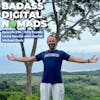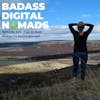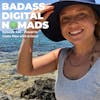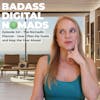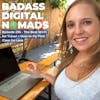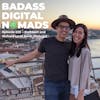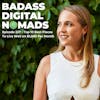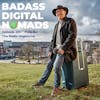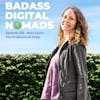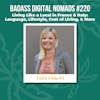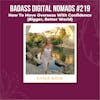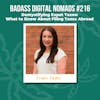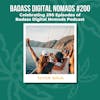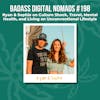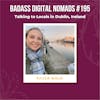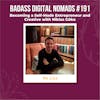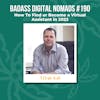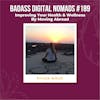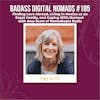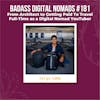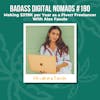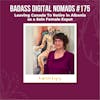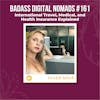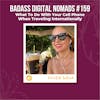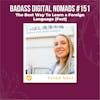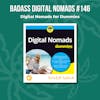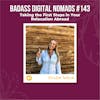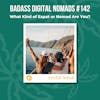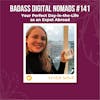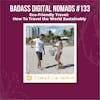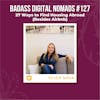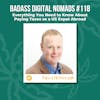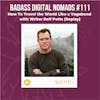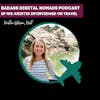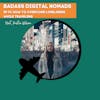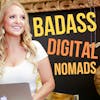How To Overcome Your Fear of Anything With BBC Travel’s Mike Corey
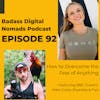
Learn how to overcome your deepest fears, find happiness, and achieve your dream career and lifestyle with Mike Corey, Host of The BBC Travel Show and YouTube’s Fearless and Far.
Learn how to overcome your deepest fears, find happiness, and achieve your dream career and lifestyle with Mike Corey, Host of The BBC Travel Show and YouTube’s Fearless and Far.
Five years ago, Mike made the decision to quit his safe and secure (but boring) job to pursue his dream of making travel videos. His choice paid off and now he’s here to share how he did it so you can, too.
In this episode of Badass Digital Nomads, Mike and Kristin break down the mindset shifts required to overcome the different fears holding you back from pursuing a lifestyle beyond the mainstream. They also speak on the challenges of full-time travel, especially during COVID, and discuss why the world’s most dangerous countries are actually much safer than you’d think!
At the end of the interview, Kristin asks Mike two questions he's never been asked on a podcast before. Then, he shares his candid thoughts on travel versus luxury tourism, the best off-the-radar countries he’s been to in the world (out of 80+ countries), and few times that he truly felt his life was in danger while traveling (like that one time, at a Mexican fireworks festival...)
If you’re determined to overcome what's been holding you back, uncover the best version of yourself, and get a major dose of travel inspiration, buckle in for the ride and let's do this!
(Warning: Explicit Content)
"The cave you fear to enter hides the treasure that you seek." - Joseph Campbell
TOPICS DISCUSSED/WHAT YOU’LL LEARN:
- The quickest way to get un-stuck in life.
- Why looking dumb is the first step at being badass at something.
- How to boost your serotonin by doing hard things.
- Where Mike traveled during the pandemic and the differences he noticed in those countries compared to before.
- How COVID and masks have changed how people communicate through travel.
- The harmful effects of fear and the news/mainstream media on society and our collective consciousness.
- How Mike chooses which countries to go to and what to do there.
- Why he buried himself in the sand for 24 hours in the Philippines.
- Mike’s experience exploring body suspension.
- How to shift your mindset and embrace your fears to achieve immense growth.
- Advice for people who want to quit their safe and secure job to pursue something riskier.
- The power of “f*ck you money”.
- Why Mike dislikes high-end, luxury travel.
- The true impact humans have on our planet and the small things we can do to help save it.
- The difficulties and negative aspects of traveling full-time.
- Mike’s experience at the Bulls of Fire Fireworks Festival in Mexico.
- The most underrated and safest countries to travel to.
- Mike’s favorite neighborhood in Mexico City and the story behind the Mexican Flag.
QUESTIONS ANSWERED:
- What has it been like to travel during the pandemic?
- Is it irresponsible to travel during COVID-19?
- What are the most dangerous countries to go to?
- Why is Stoicism an important part of the life of a jet-set traveler?
- Is fear a signal that we’re on the right or wrong path?
- How do you cope with the loneliness of traveling solo full-time?
- Have you ever regretted a decision you made in your travels or felt like you put yourself in too much danger?
- Which countries do you keep going back to?
- What are your travel plans for 2021?
- How has your perspective the status quo lifestyle changed since coming back to Canada after years of traveling?
SHOW NOTES & RESOURCES
- Book: The Obstacle Is the Way by Ryan Holiday
- David Attenborough: How to Save our Planet
- Kristin’s Article: 12 Ways the World Will Change When Everyone Works Remotely
- Kristin's Article on The Daily Stoic: "A Stoic Guide To Climate Change"
- Kristin's Interview with Rolf Potts, Author of Vagabonding
- Kristin on Stoicism:
- Travel Massive
- Quetzalcoatl’s Nest Airbnb in Mexico
- Two things all digital nomads, remote workers, and world travelers need:
TRAVEL DESTINATIONS MENTIONED:
- Mexico
- Yemen
- Turkmenistan
- Pakistan
- Angel Falls, Venezuela
- Mauritania
- Sarajevo, Bosnia and Herzegovina
- Catanduanes, Philippines
- Sulawesi, Indonesia
FEARLESS AND FAR VIDEOS:
- Mike Burying Himself in Sand for 24 Hours
- Bulls of Fire Mexico Fireworks Festival
- Suspending His Body by Hooks
CONNECT WITH MIKE:
- Fearless and Far website
- Fearless and Far on Instagram
- Fearless and Far on YouTube
- The Travel Show on BBC
.......................................................................................................
Thank you to my 2021 Patrons! Teklordz, Trader Walt, Shawn, Karen, Christine, Erik, Heather, Colin, Craig, RZ, Timothy, James, Richard, Fred, Lakshay, Issac, George, Scott, Michael, Derek, and Issac.
My goal is to create a community of 100 Patrons in 2021! You can become a Patron for $5/month at Patreon.com/travelingwithkristin and see all my YouTube videos first, attend monthly live streams, submit questions for the podcast, and be the first to find out about special offers and guests, as well as the chance to participate in beta programs at free or discounted rates.
.......................................................................................................
Support the Badass Digital Nomads Podcast:
- Become a Patron for $5 per month
- Leave a 5* Review: https://lovethepodcast.com/digitalnomad
- Buy Official Merch
- Search All Episodes: www.badassdigitalnomads.com
Connect with Kristin on Social Media:
- Follow on Instagram
- Subscribe to Traveling with Kristin on YouTube
- Subscribe to Digital Nomad TV on YouTube
- Join the Badass Digital Nomads Facebook Group
Podcast descriptions may contain affiliate links of products and services we use and recommend at no additional cost to you.
Sneak Peek:
Mike: 00:00:00 But I was filming him and he, he had no shirt on. He had this like skull mask thing on, and he's like, yeah. And there's like bulls exploding behind him. And I'm like, cool. And like, let's go. And he is like, yeah, yeah, Mexico. And I was like, go move. And he was just like, still like, staring at me, yelling. And the camera was down and I was like, bro. And I went to go grab him. And the fuck the bull hit him from behind and the bull fell over. And the fire, and, and I, that's, that's how people die in the festivals. Oh my God. 'cause they don't pay attention. They're drunk. They get hit by a bull. The bull falls on them, and then they just get torched or something.
Introduction: Welcome to Badass Digital Nomads, where we're pushing the boundaries of remote work and travel, all while staying grounded with a little bit of old school philosophy, self-development, and business advice from our guests.
Expat Money Show
Kristin: 00:00:56 Hi everyone. Kristin from Traveling with Kristin here. And before we get into today's episode, I wanted to let you know about another podcast that you should definitely subscribe to. My friend Mikkel Thorup is the host of the Expat Money Show. A top rated podcast for people like you who love to travel, are looking for more freedom in their lives, and who are curious about living abroad and the expat lifestyle. With more than 100 episodes to date, Mikkel goes deep into topics like offshore citizenship, banking and investing. Mikkel is one of the few people I've met in this space who definitely knows what he's talking about. He's traveled to more than 100 countries in the last 20 years and lived in eight of them as a full-time expat. The Expat Money Show is available on Apple Podcasts, Stitcher Radio, or anywhere popular podcasts are found. There's a new episode every single week. And previous notable guests have included Jim Rogers, Doug Casey, John Perkins, Grant Cardone, and yours truly, Kristin Wilson. Subscribe to The Expat Money Show today and make sure to catch Mikkel's, episode 71 of Badass Digital Nomads on How to Live, Work, and Invest Offshore. And now on with today's show.
Kristin: 00:02:29 Hi fam, it's your girl, Kristin Wilson here, and welcome to episode 92 of Badass Digital Nomads. Today you are going to learn how to fight the fear and do it anyway from the fear expert himself, Mike Corey of the YouTube channel, Fearless and Far. Mike is a former biologist turned travel host who used to live in a cockroach infested apartment in Canada where he had to share a bathtub with a 70-year-old man. TMI, I know, stay with me here. But now he has his own travel show on the BBC. Not bad. Today's episode is packed with travel tips and stories from Yemen to Europe to the Philippines. But you know how we roll here. It's also grounded in practical advice that you can apply in your life today. If I had to sum up Mike in one sentence, I would say he's like, Bear Grylls, Anthony Bourdain, the crocodile hunter and stoic philosopher, all mixed together. But 100% his authentic self. Mike has seen and done some crazy stuff in his travels, and you're gonna learn all about it right now. Enjoy.
Podcast Interview:
Kristin: How many years were you traveling and living this lifestyle before the pandemic happened? And then how did you adjust this year?
Mike: 00:04:01 Yeah, I've been doing this, I've been traveling for 10 years. I've been doing this job professionally, like full-time career for about seven now. And that's changed over the years. What exactly I was doing in the beginning it was travel filmmaking, so I wasn't really on camera. And then it was more photography landscape and things. And then it shifted more into YouTube where it's, it's the channel and now I do more TV, uh, and also still YouTube. And it was just the, the pace was becoming faster and faster and faster. And I, I almost became, I wouldn't say, well, actually I'm not almost addicted. I was, I am addicted to, to the pace. Often I equate this life to being on a speeding train, holding on with two fingers, just barely being able to keep up. And just to understand, like before the pandemic kind of shut the whole world down.
Mike: 00:04:48 In early March, I, I kicked it off in Mauritania doing train hopping in the Sahara, there was an iron ore train that locals ride that people can ride to, and like, where the hell is Mauritania <laugh>, it's a, anyway, a country in, in West Africa, one of the least tourists in the world. And then from there bounced over to Bangladesh, where we went to hunting, was some tribal groups, and then went over to Bangkok to do, uh, some Sak Yant tattooing, uh, with like the giant sharp sticks. And then went over to, uh, Argentina and Brazil with BBC. So even before March, I'd already been to I think 10 countries or something just in those few months. And that's, that's how it's been. It's been 11 months of the year for the most part. Uh, I, I was living in Mexico City for a while.
Mike: 00:05:32 I love Mexico and I love Mexico City. Um, partly because everyone thinks they, they know Mexico and they, they know Mexico City, for example. But most of our impressions of that country are Tex-Mex. They're, they're unfounded and there's lots of bad things that happen there, but they don't really define the country. And that's my travel style is finding these things that are misunderstood and trying to show what it's really like. But doing my research, not being reckless, like making sure I I I understand myself exactly what's happening, but then trying to show people what it's like underneath. And so Fearless and Far, my YouTube channel is all about that kind of travel. And it's been, yeah, like faster, faster, faster. And then when the pandemic hit in early March, I was actually in Yemen, believe it or not, on the island of Socotra, which is a bit like Madagascar or
Kristin: 00:06:22 Is that where all, all the weird trees are?
Mike: 00:06:24 Exactly. Yeah. The dragon blood trees that if you cut them, they bleed red sap. It's crazy. And because these islands are so old, uh, that are off of Africa, there's all these endemic species that are only found on these islands, right? Same with Madagascar, for example, with like lemurs and leaf tail geckos and things. And so we were there and I got a, a scratch on the tent at like 3:00 AM saying, oh yeah, you know, that flight you're supposed to take in a week and a half to leave, that's canceled and the only one leaving is in three hours. And if you don't leave, you're gonna be stuck here indefinitely because the pandemic shutting down the world. And we had been like off the grid backwards and had missed a lot of the current events that were happening. And so I <laugh> I had to go.
Kristin: Oh my god.
Mike: 00:07:07 I actually had broke my, broke my laptop, lost my wallet, and the world was closing. So it's like about time to wrap up this <laugh> this trip for a few months anyway, but went back to Canada, spent four months in on the East coast. I'm from New Brunswick, which is right above Maine. Uh, and Fredericton actually, that's where I am right now, back home. And then as soon as Canadians could travel to Europe, I was gone again. So that was July 6th. I took off July 2nd, we could travel to the EU. And again, very few people did, at least in, in our, in our bubble of, uh, of travel influencers. Uh, people weren't really traveling then. And I, I had to make a, I had make a choice. I could silently sneak away, um, or I could say to the world via YouTube and the social platforms, like, this is what I'm doing and these are the precautions I'm taking.
Mike: 00:07:56 This is why I'm doing it. This is why I feel it's important. This is how I'm gonna make sure I don't make my decision negatively affect other people's decision. But if a country is open, then that's like, then that's open for tourism, that they're saying, tourists come, come back. Is it unethical for me to go do that if a country says welcome back?
Kristin: Exactly.
Mike: You have to watch a few things. You have to watch a few things get, I mean, you don't, I didn't have to get tested when I arrived. I didn't have to quarantine both things I still chose to do. Uh, but it, it, it was an interesting debate, so I made some content about it as well. We both did, right? Yeah. Because traveling during the pandemic was something that was possible, but a little bit controversial at the time. And even now, it's still considered probably quite controversial too.
Kristin: 00:08:39 Yeah, it's, so I love that you saw my travel update videos before you knew who I was and before we had this interview. Yeah, I'm still getting comments from people like, don't travel and it's irresponsible, but I'm of the same mindset as you. Like if a country is open and they put forth their entry requirements and you can meet those requirements, I think that it's responsible if you go as long as you abide by their rules and take the appropriate precautions. And then on the flip side, there's these countries that are suffering economically because they're cut off from tourism and their lifeblood. So I do see both sides of it. What was it like, uh, where did you first go during the summer? Which countries did you go to and what was it like compared to pre pandemic?
Mike: 00:09:26 Right. So I flew from, so again, from my hometown here in Fredericton to Toronto, and then from Toronto to Frankfurt, and then, um, went immediately to Poland actually. And then spent a month in Poland, uh, a month in Romania. Went over to the uk actually to Scotland for a week for a BBC television shoot, came back and then did a month and a half in Turkey also. And there was also another month in Germany there as well where we traveled around a little bit too. So a lot of that part of the world. And it, uh, it was, I didn't know what to, I didn't know what to expect. I, I knew that I was going to take above the above and beyond. I was gonna go above and beyond to take precautions that weren't even necessary of me, just to make sure I had all my bases covered.
Mike: 00:10:16 And also, so if I was gonna be showing that I was traveling, showing that, I also demonstrating that, hey, if, you know, just make good choices. And also it's really nice to go above and beyond because you never know where your dirty feet are being tracked around, right? I didn't know if the locals would be upset to see me. I didn't know if they'd be kind of like, uh, leper, you know, the foreign traveler in their homeland. I, I didn't know what to expect. But honestly, some of the most difficult parts were going to like getting tested in, like, for example, Cluj in Romania. And then, but because we were gonna go to remote parts, so wanted to make sure that we, we were covid negative and then going up to these remote parts and then meeting these like sweet old people, um, who were like with, and we'd have our mask on and trying to keep distance and just film and then them, them like offering food and like taking you by the arm and you're just like, because they, I don't know, maybe they don't have the luxury to be able to lock themselves away.
Mike: 00:11:11 Maybe they don't care. Maybe they, I don't know what the deal is, but it was, it was weird for me because I, I realized that social interactions really important for travel. It's not just about like landscapes and mountains. It's about meeting people and having these really cool moments with the, you know, the babushka when she gives you vodka or whatever it is, or you're playing chess with the guy in the park. Right? Like, and those were always a bit strange, especially I, myself, being much more cautious than the locals often were. And then what do you do? Um, exactly. You know, like, and people think like if you're wearing a mask around them, then you think they're dirty and sick and it's just, it got a little bit strange when you got to some more of these, these remote communities.
Kristin: Yeah.
Mike: And I always wanted to make sure I was, yeah--
Mike: 00:11:56 So it, it, at times it was difficult only only for that because again, I, I always love to show appreciation to people who go outta their way. And that's what travel is, especially in these more remote countries, like, again, like Romania for example, where they don't see that many tourists if you go out of, outside of Dracula Castle. And, and I'm always so used to really making sure people understand that I'm, I really appreciate the, the, the effort, the hospitality that they give me, because you get so much hospitality in those places. And it's just like the, the, the code of travel, like the truth of travel is, is these places that might be tours unfriendly are always like the friendliest, right? Um, and it's really hard to have genuine human experiences when everyone's all masked up and, uh, a little bit scared. Right or at least--
Kristin: 00:12:44 Yeah. So yeah, it's actually all in actually hard to even communicate with people with the masks on
Mike: 00:12:48 Yeah. With accents and you can't really like see their mouths and everything. Yeah. Very difficult.
Kristin: 00:12:52 I was just saying to my bar teacher <laugh> that we were trying to talk and she's like, what? And we kept saying, what over the music? And I was like, you know, I didn't realize until the pandemic how much is lost in translation when you can't see someone's facial expressions and their mouth moving
Mike: 00:13:11 And No, but we're such sensitive creatures. So I was back getting my passports renewed just a few days ago. And I, I wanted to get two different sets of photos. 'cause I actually have, I have a, a primary passport and a secondary passport so I can send one away to get a visa and still travel on the other. And it's easier if I have two different photos because I, if I mix up the passports once, it, it like, really bad things happen.
Kristin: 00:13:31 Are they both Canadian?
Mike: 00:13:32 And so it was like-- Yeah, both Canadian passports.
Kristin: Oh, okay.
Mike: And so, um, I changed my shirt and I wanted to give a, I wanted to do like a, a similar facial expression, so I tried to do it again, but I, I remember smiling, like, feeling like I was smiling just like one millimeter more and the photos. And I remember looking at my face in both photos and that my face looked so different, even though I just moved like a little bit. And I realized how sensitive we are to every small little, like, quirk of the, you know, the lip or the eye or the twitch, like every little crease and wrinkle and movement means so much because that's how we communicate. Same with like chimps and some of these animals too. Like we're so visual and we can re even when you look at somebody, you can tell if they love you or they hate you, or they are suspicious just by like small little tiny things. And now that's been compromised, heavily compromised. And it makes social interaction really, especially when you have to get in the back of a car with maybe someone you don't know very well in some random street in, in Istanbul. And you kind of have to do a judge of character quick, but you can't really see them and they can't see you. And it, it gets weird for sure.
Kristin: 00:14:37 That's true. It's almost like other senses have been elevated more. And I think back to like a couple years ago I was in Japan and I through like a friend in Tokyo got this recommendation for this restaurant, like the best restaurant in Hiroshima to eat. Um, I think it's called Okonomiyaki, is that right? That, um, it's like a kind of like a fried omelet with like cabbage and octopus and feel sauce or something, an egg. It's like a lot of different weird stuff together. But it was me with this just like old lady Japanese cook who didn't speak any English, and then her friends and some locals and we're all just like drinking beer and she's making the food in front of us. And I actually, I had never published this video, but I took some video clips during that and we're all like laughing and communicating somehow through that like, parallel universe that you communicate with people that you don't speak the same language. And I was thinking about that this year and how much different it would be traveling without having, you know, being squished into the, you know, the coffee shop, getting espresso in Italy or being like shoulder to shoulder in this little hole in the wall bar in, you know, a suburb of Hiroshima, Japan. Like, you know, having to socially distance in places and wear masks. It's like, it's kind of sad, but at the same time we'll get through it. It's like humans, we get through everything. And So are you back in Canada now?
Mike: 00:16:14 Yeah, I came back home to renew those passports. Uh, so I had to spend two weeks in quarantine. And where I'm from in Canada, it's even sectioned off to the rest of Canada. So Canadians outside of this province can't even enter this province without having to quaran or they, sorry, they can't enter at all. And if even if I go to the next province, come back, I still have to quarantine this province. So it's like a bubble within a bubble. And they've had very few cases here. I think they just had their eighth Covid death total. Wow. And there's, there's no community spread here either. Uh, basically zero community spread. So it's a, it's a different world, uh, but everyone's still very afraid. Um, but that's what happens when you watch the news all day. You know, if you, if all you see is just covid, covid, covid, covid, then all you think about is covid, covid, covid, covid, covid.
Mike: 00:17:03 And then, like for example, I went into the store, uh, yesterday and I walked by somebody and I maybe got a little bit too close and she jumped in like, like, was just shocked that I, I had walked within like, it was like within two feet of her or something. And she's, oh, imagine living that, that that life. Uh, I, I think as travelers maybe our, our baseline risk is just used to being a little bit higher than normal. So we're used to having our, our foundation cracked by whatever it is. Uh, but some people don't have that. And I guess I'm not saying it's not serious and we shouldn't worry. And, and, but I, I spend my life speaking about fear and there there's fear is this infectious poison that completely destroys your life. And we don't realize how much it affects us until it's almost too late.
Mike: 00:17:48 And I'm not saying don't worry or don't take precautions. There's many, like, there's many serious things that we, we should take action with, but we shouldn't act with fear. Um, because fear is emotional, it's irrational, it's infectious, and we catch it from other people too. We catch it from the news, we catch it from bad advice, we catch it from our friends and family, and it stresses us out and it, it holds us back. And I mean, um, obviously choosing to travel earlier this year was a controversial thing, but, um, I, I did the research and I decided that I wanted to, and I did. And I also encourage other people to, if they were interested, but to do so accordingly too. But fear is one of those things that I, I feel now is, is even more infectious than the virus. Um, and it, it, we're not gonna see the effects of this very soon either. It's gonna be a slow kind of systemic problem as well where there's gonna be a lot of depression, there's gonna be a lot of, you know, a lot of problems resulting from this.
Kristin: 00:18:45 Yeah. Let's talk about that because I actually just recorded a video the other day. I haven't published it yet, haven't finished editing it, but it's about kind of my reflections on the US living here this year after being gone for almost 20 years of my life. And one of the first things I noticed was the fear and the outrage. Well, I noticed like a lot of the, just the stuff, right? Like the materialism and the convenience of the US in particular, even more so than Canada. But then after that was just the like, prevalence of the mainstream media and how everything is at an 11 when it comes to fear and outrage. It's like, these are the two, these are the root chakra, like lowest vibration emotions, and it's being like pumped into the, the collective consciousness of the country 24/7. And so that's where people are operating out of.
Kristin: 00:19:48 And it's like, let's take it down to like a five, maybe. Like let's take it from an off the Richter scale to somewhere in the middle. And I notice this with my friends who have been here, you know, since high school and haven't lived abroad. I notice it with my family members, like no offense to my parents, but it's like I have to catch myself before I start to buy into that because we are a product in some part of our environments. And when you travel at the pace that you and I have traveled for so long, you become more objective and independent in some way because it's, you are not in a place long enough for it to really impact you. Like if you went to Australia, you wouldn't pick up an Australian accent, you know, <laugh>, like, you would just pass through and you kind of like figure out who you are not as a reflection of where you live or what you own or what you have.
Kristin: 00:20:49 And you just become like you and you're kind of unadulterated self. But then on the extreme side, when you travel full-time for so many years, you can also kind of start to lose yourself in a way. But coming back to the US and not having lived here since college really made these things very apparent to me. And even <laugh>, what you were saying about how like, not caring when stuff is uncomfortable or when things go wrong. Like I just moved into this apartment, um, over the weekend and like, it was super dirty and like everything was broken and the hot water heater has been broken for the week. And I just, like nonchalantly told the landlord, there's an infestation of flies and like, it was crazy, but I've been in really way worse situations, so, and I just told him and he's like, wait, so you've been going this whole week with no hot water?
Kristin: 00:21:43 And I'm like, yeah, like <laugh>. I mean, he was like blown away. He's like, oh, so sorry. And I'm like, no, it's no big deal. Like I take cold showers anyway and you know, I've like lived in places with no hot water for like a year or something. Like it's not a big deal. And it's Florida, it's not that cold. But I think just like, I don't know, just kind of having this layer of indifference to like the small, minuscule things and like keeping the big picture in mind. I think that travel has given me that I don't think that I had that perspective before. And I have talked about in the podcast before that it took me a good like seven to 10 years of unlearning what I thought was true in the world and replacing it with a new paradigm that I thought was more accurate with actual reality and not with propaganda and not with my cultural upbringing and things like that. So, long question, but yeah. What has your perspective been on like coming back to Canada after all of these years and seeing it from this global perspective?
Mike: 00:22:54 Yeah, so this town I'm from has maybe, I think it's like 60,000 people, 50,000 people. I'm actually from a, a suburb outside of that. So there's even less here. And not a lot of people travel here, travel the world who are from here. And just exactly like you said by traveling, you, you pick up things and it's like, I think you're, when you're born, you're gifted this lens of the world, right? You didn't choose it, you just have it like the cartoons you watch the school, you go to what your parents say, who your friends are, and that's how you see the world. And I think a lot of people, at least this is my story, I didn't really feel like I fit in. I didn't really know the lens I had. The world was not so clear I couldn't clearly see my place. And that stayed with me until I started traveling.
Mike: 00:23:37 And then I realized that I can pick up little pieces of, of lenses around the world. Um, you see different religions, you see different foods, you see different languages and, and ways of acting and, and you kind of piece together the ones that fit, fit best for you and you can create your own lens of the world and that does stick with you forever. And then with that, I was able to find myself and find my voice and find my brand and ultimately my happiness. And so when I do come back, it's, it's, uh, it's strange sometimes. Um, there's a, there's people here who are, you know, quite stuck in their ways. And also a lot of people ask like, you know, how did, how could you do this? But like, I I would've wondered the same thing because if you're in a, in a place in a small town, for example, you're not gonna meet the world traveler at the bar.
Mike: 00:24:30 'cause the world traveler out there traveling, you're gonna meet people who are, have lived there their whole lives and maybe have comfortable jobs or maybe they're happy, maybe they're not. But at the end of the day, you're surrounded by people who all kind of think the same and are doing similar things with similar lifestyles. And they're not gonna recommend you go on a solo backpacking trip to South Southeast Asia for three months because they haven't done it. And all I've heard is like the negative data points of, you know, hepatitis or beheadings or all these different things. And unfortunately that kind of news, it, it it, because news is basically just a clickbait fight. Whoever can have the most sensationalistic title gets the clicks, get the, gets the ad ad rev at least online or the ratings or whatever it is. Because we're, we, we draw attention.
Mike: 00:25:15 We, we, we loved hearing about these stories. I think just our default programming because humans are, or we're fearful creatures, we don't have fangs or talons or wings or we can't breathe fire or spit poison. And so our natural instinct was to use our big brains and get the hell out of there. Uh, with our fear response, I think of a healthy fear response is very human, because otherwise we can't compete against some of these prehistoric monsters that have been around for even some of 'em are around right now. You know what I mean? And so I think our, our, our fear system is, is hyperactive, like, like pin pin drop, like super trigger happy. And because of that we really are drawn into these ideas of like, oh, the terrors of the world, I guess we, we, we used to be able to use that information effectively.
Mike: 00:26:01 Now I feel like, I don't know what the default tribe size was for humans when we were living in tribes, let's say a couple hundred or something. And if one dude gets bit by a snake, then you have like a rough understanding about like, you know, okay, one guy dies from a snake or two or five or 10, this is the risk level in this, this default tribe size. But now our tribe is like 7 billion and we hear everything all of the time. But I still think our, like lizard brain is, is programmed to think on a smaller level. So when we hear that there's been a tourist kidnapped in Indonesia, we think like, I'm never going to Indonesia again, <laugh> for like a decade, two decades. Yeah. Right. Yeah. 'cause but it's, it's, it's like, I guess our risk assessment is all outta whack.
Mike: 00:26:44 Like how many, how many millions, hundreds of millions of tourists go to Mexico every single year, right? It's incredible. Um, but we hear like one or two crazy stories and it's like still a, a preposterously low number of anything that's gonna happen. And so anyway, these news, these news articles prey on that and then we develop these fears and then we, we spread these fears to other people then they, anyway. And so it's, it's a big mess. So I guess what I'm saying is I'm really happy that I had the circumstances in my life and also some encouragement to go travel because it allows me to put this lens together. And when I, I come back here or I hear all these news stories about whatever it is happening in the world, I'm like, yeah, mm. And I turn it off because it's usually people who haven't been there who don't know anything about it, just heard a story from someone else, or they're reporting it because someone told 'em to because it's gonna get clicks or likes or ratings. And it's not the real representation. Sometimes there's legitimate fears out there, but I always take with a grain of salt, always, always, always. And you know what, 99% of the time it's some overblown, overinflated thing all hopped up on, on, you know, exaggerations or whatever. That doesn't really have much truth to it in the end.
Kristin: 00:27:51 Yeah. I mean I used to say even back in high school, um, whenever I read something in the newspaper, you know, back when there were newspapers, I remember saying to my dad once in the car, you know, anytime I read an article about something I know about, I realize how many inaccuracies there are in the article. And I was like, does that mean that every article has a lot of wrong information in it and we just don't know because we're not experts on those topics? And he was like, yeah, pretty much <laugh>, he's all,
Mike: 00:28:23 but we just continued going forward. Like, oh, this is how life is, right?
Kristin: 00:28:27 Yeah. And you make such a great point with the dangerous, um, concept and what's dangerous and what's not, because one isolated incident happens in a country and then it's like the whole world attributes that incident to that country. Like they correlate them together. It's like, oh, then let's assert that this country is therefore dangerous. Like I went to, oh, Mexico's a great example. I've been going to Mexico since I was 16 years old, and anecdotally I've never experienced anything but like nice people and nothing's ever gone like very wrong <laugh>, you know, other than like food poisoning and stuff like that. But people still ask me like, because I do relocations to Mexico, and they're like, but is it safe? And I'm like, yeah, I mean maybe it's not safe. If you were that guy who was going out exploring locations to film, what was that show about the drug cartels?
Mike: Narcos
Kristin: Oh, Narcos. Yeah, Narcos. Yeah. Yeah. Like maybe something happened there, but like, you're not gonna be going into like Narco-ville looking--
Mike: 00:29:32 Yea and don't go sell MDMA at a nightclub either, you know, like,
Kristin: Right
Mike: <laugh> you'll be okay.
Kristin: 00:29:38 But otherwise, like you're 99.9% of the people in every country are <laugh> like to use, what is it? Trump always says this, they're good people or you know, like Mexicans, maybe some of them are good people. It's like, no, 99% of the human race is good people because we're all humans. And then there's like a few bad apples in each country because of just distribution.
Mike: 00:30:00 They just love putting them on the pedestal. Yeah.
Kristin: 00:30:03 Yeah. So I don't know if there even is a dangerous country. Like I would go to, uh, Eastern Europe is a good example. Like in the Balkans people are like, oh, aren't you afraid to go to like Serbia or Bosnia or Sarajevo? I'm like, you mean because there was a civil war there, like <laugh> eighties back in the nineties and they said that in Nicaragua. I lived there for a year and I'm like, yeah, and maybe it was dangerous in the eighties during the revolution, but like, not anymore. But people just like time is frozen in their heads. And so they just think, well, yeah, because there was the Bali bombing then that means Bali's dangerous from now on or something. And so do you think like how many countries have you been to and are any of them really dangerous? I mean, you've got the global peace index, you've got some countries that obviously still have like military presence and things, but what's your perspective on that?
Mike: 00:30:59 And just going back for one second, I like, I like to think about it this way. Uh, if there was, you know, a tourist, a tourist that got shot in Seattle, would you still go to Florida? <laugh>? You would. Yeah. Like it, they're, they're really far apart, right? Um, but why do we not think that way with other countries really, you know? And so, um, but that's, that's kind of how our brains work, if you only hear about,
Kristin: 00:31:22 It's kind of racist actually
Mike: 00:31:23 I think, and if you only hear about Sarajevo once with the, the siege it was in the nineties or eighties, um, that's your only data point for Sarajevo Bosnia and Herzegovina. And so then I guess that's all you have to go on, which is, it's bad there, right? But oh my God, it's, it's incredible. Like Sarajevo's so beautiful and you can still see the scars from, from what happened there. But, uh, my god,
Kristin: 00:31:43 The little holes in the wall, they like, they have not repaired many of the bomb and the gunshot.
Mike: 00:31:50 My God. One of the coolest things was the Sarajevo roses, where the, the mortar shells would hit the asphalt and instead of repairing the asphalt sidewalk or the concrete sidewalk, they filled them in with red resin. So you have these like splashes and they call them Sarajevo roses that are filled in from the, the, the shrapnel. It's, it's, it's, anyway,
Kristin: 00:32:09 that's so heavy.
Mike: 00:32:09 That's pretty crazy place. But answering your question, so yeah. Um, because my travel style's a little bit different. I do, again, I don't just go, what's the most dangerous country? Let's go. I look at some countries, I see the story, I see, I find some things to do there, and then I kind of research whether or not it's, it's something that's interesting, so, or something that's doable. So some countries I, I've been to just in the past year was Mauritania, which is one that's some would consider quite dangerous, I guess. But it, it was an amazing experience. It was in Turkmenistan last year as well, was in Pakistan. Um, someone would considered maybe Bangladesh a little bit rough. Uh, I was in Venezuela almost at the height of all of the, the talk
Kristin: Wow.
Mike: The, the, the protests and everything down there as well. But I don't just randomly show up in these countries.
Mike: 00:32:53 I, I have a contact, I speak to the contact. So I had a, for Venezuela in particular, I had a friend of mine who had been living there for six years or for five years teaching English. And he's, he's a white Canadian guy and he takes his motorcycle and drives it around and, and, um, I had the opportunity to go, he invited me. And so I talked to some friends, they're like, you can't, you can't go to Venezuela. You can't, you seen the news. But I talked to my buddy who lives there and he is like, listen man, not gonna lie. Like in Caracas especially, it's rough. I've been biking around. I can't tell you anything for sure, but I can tell you that it's fine. There's a few things we might have to, you know, just keep, keep, you know, watch, there'll be a couple extra police checks, but we'll, we'll have a good time and I'll make sure we, we, everything's fine.
Mike: 00:33:38 And so I went down for two weeks and saw like Angel Falls and did a little road trip around and it was like, Venezuela is one of the most beautiful countries I have ever been to out of 70 or 80.
Kristin: Wow.
Mike: It is incredible. Like, um, I guess I thought Angel Falls was like a one-off. So the highest waterfall in the world is like a kilometer. You've seen it in the movie up, but on the way to Angel Falls, you have to take a, like a six hour boat ride. There's like hundreds of Angel falls just a little bit smaller. Like there's these beautiful table mountains and these spouts of water just falling off these tables left and right the entire way. And you're like, how is this not like a world class attraction? It's because of the government and, and the problems. Yeah. But it, it, it's, it's like avatar there. It's, it's incredible. Um, I couldn't, I couldn't believe it.
Kristin: 00:34:23 Wow. Yeah. Rolf Potts says that like the, the bucket list destination is just like the jumping off point for the actual journey. It's like you can get inspired to go see one place, but then it's what you see before and after and along the way and all of the detours that really makes it special.
Mike: 00:34:42 Exactly. Yeah. And over and over again, when I visit these, these countries that people don't go to very often, it's just incredible how much kindness and hospitality you receive. In Mauritania, we, we were receiving oh eight to 10 invitations for tea every single day. Uh, everyone was just like kind of fighting over who was gonna take us to, to, to have tea. And they had this strange tradition where they both pour the tea back and forth for 15, 20 minutes to like build a froth up because the frothier the tea, like the more important the guest is <laugh> and you always have to have three rounds of tea. So it's always gonna be like an hour <laugh>. Anyways, <laugh>,
Kristin: 00:35:21 You're like, we have only so many hours in a day, <laugh>.
Mike: 00:35:25 And the first time you see it, you're like, wow, this is so cool. Then after three days of tea, it's like, let's, let's move it, let's move it along. <laugh> <laugh> and in Turkmenistan we were, we were there. And, um, oh, I go see the door to hell, this giant hole in the ground. It's a burning pit. That was a mining, a Soviet mining accident from like the eighties, I think. And so it's called the Door to Hell 'cause it looks like a door to hell, A big burning, massive crater in the earth. Only place in the world. You can see something like that. And so we're there and it's like no one goes to Turkmenistan, um, at all. And so we were there all by ourselves. And then a family comes of, of local, local Turkmen people. And there's like, you know, the grandma and the kids, and this is like about a year ago.
Mike: 00:36:06 And they set up a giant picnic and they invite us over and they, they wouldn't let us leave. They, they fed us food and every time we tried to get up, 'cause we were like, no, no, no. And they'd take our shoulders, put us back down and bring us more food. And we literally had to roll our way out of there and run because they would not let us go. It was just, they, they were just so happy to have us there and so happy to see us. And, uh, because they don't get many tourists there, of course, right?
Kristin: What's the food like there?
Mike: it was like a lot of, um, like, um, like the, I don't wanna call it kebab, but like, like the meat on a stick. I see it a lot in, uh, in the Middle East type of things.
Mike: 00:36:44 But yeah. And then rice and they would eat with their hands as well. And it was, it was really cool. But that's it. These places, these places that don't get tourists very often really appreciate you. And it's so cool to go someplace and just like, appreciate you being there and like, you know, making a movie about their country and they're always so excited and they always have so many things to share and, and you know, you go to, uh, I always like compare it to like a bike lane in Amsterdam. You go, you go stand in a Bike lane in Amsterdam. We'll see how happy the people are that you're there. <laugh>, <laugh>. But it's just the exposure. Too many tourists right over tourism's a real thing. And if you're, if, yeah. So it's, it's uh, that's why I love going to these countries that are, it is bit off the map.
Kristin: 00:37:22 It really is, I've actually seen Costa Rica and Nicaragua. 'cause I spent a lot of time in those countries and I've seen them change over like 10 years. Like from the people being so nice and so friendly to like more opportunistic, more theft, more violence, like, I don't know, more scams and <laugh>, I don't know. Same in places like Playa del Carmen that were like really chill at first. I've heard in the past couple years, like it's got, there's been like more crime and stuff. And my ex-boyfriend used to joke around. He was like, if anyone ever says my friend to you, like run the other way. <laugh>.
Mike: 00:37:59 Yeah. That's so true. <laugh>.
Kristin: 00:38:02 But I saw that you were, um, buried in the sand for 24 hours or you buried yourself in the sand. Your friends helped. We'll talk about that. Yeah. Um, and that the Filipino girl walked up to you and gave you some food. Can we just talk about how nice the Filipinos are? <laugh>, because I put that, I made one video about the Philippines and I was like, if there's one message I would like to get across, it's like how nice the people are here and they're some of the poorest people in the world, but like, so generous, so friendly. I don't know. Which island were you on? Where you buried yourself?
Mike: 00:38:39 Oh, my, don't do this to me <laugh>. Um, it is in the far, do I have a Philippines?
Kristin: 00:38:44 Do you have like maps behind you?
Mike: 00:38:46 Uh, Catan--duanes. Catanduanes
Kristin: 00:38:49 Sounds very remote.
Mike: 00:38:50 We have a, a dude who plans the trips for us. Uh, uh, he's like one of the friends who lives there. And so he's like, all right guys, this year we're gonna go here, here, here and here, get the scooters and go. But it was, it was, uh, Catanduanes is where we were.
Kristin: 00:39:02 Okay. That sounds in the middle of nowhere. <laugh>.
Mike: 00:39:05 Yeah, it was, it kind of was. And that's, that's again, like we were there. I did this, this idea of, of being able to challenge myself and myself in sand, but that's it. She comes over, she's like, what are you doing <laugh>? And she's like, are you hungry? It's like, yeah. And she's like, hand feeding me, like chips and things. <laugh>.
Kristin: 00:39:22 That was awesome. Everyone should watch that video and all of your videos. What gave you the idea to, um, put yourself through that? I know you were talking about, uh, voluntary discomfort, the stoic principle. Stoicism seems to be something that comes up among a lot of travelers. I think in the quest to find yourself through traveling, you end up at philosophy, right? Because you learn so much about history and culture, and it's like all roads lead back to philosophy, spirituality, religion, because this is like an, uh, an existential, timeless thing where humans are just trying to figure out what we're doing here. <laugh>, what is our purpose? And so what was your path to, um, to stoicism and how are you applying that to your modern day life of a jet setting travel host?
Mike: 00:40:17 Yeah. Well, like you said, uh, a little while ago about, you know, he didn't have hot water and it's like, okay, well, like I'll, I'll message him. And he is like, you didn't have hot water for a week and it wasn't a big deal because you, you've, there's been times you haven't had hot water for a week, a month. And it, it's like, okay, let's get it, let's get it fixed, but you don't need it. And when you start cutting all these ties, these things you think you need, you become more bulletproof, right? And at the end of the day, it's just all about being happy. That's kind of the point to life is if you can, if you can, if you can make it through your 60, 80, a hundred years being happy, that's a, that's a, uh, that's a win, right? It's not easy for a lot of people, for most of us, but that, that's what we're trying to go for here.
Mike: 00:41:00 And at least for me as well with this travel stuff, one of my, my my actually my first big trip ever was to Indonesia, an island off of Sulawesi, a few islands. It was called the Wakatobi, um, island chain. But there was one, we were on doing some research projects. I'm a biology graduate and my first trip was like going with some scientists to help them, like a fresh newbie traveler. Never really left North America so much before, or especially I was in Europe maybe, but not, not to the other side of the freaking planet. And so we were there and there was no water and no running water, no power and no mirrors. And we were there for three months <laugh>. And I remember like, there was me and like a handful of other young students, like 22, 23 or something from around the world.
Mike: 00:41:43 And everyone had like their nails done and their hair jelled and their nice new shirts and like, you know, beach time and everyone just kind of, it was so cool to see everyone kind of degrade into <laugh> who they actually were on the inside, right? Because you can do up all this fancy stuff and the living unfor, well, fortunately, unfortunately, physical appearance is so, so, so important in, in the modern world. And you have to look nice, you know, if you go to a meeting and stuff, but it's not a good representation of your overall wallet, like the quality that you are as a human. But you put your yourself in a place with no running water, no mirrors for a few months, people, you see who people really are. And that made me realize that there's so much more to life and happiness than just, you know, making yourself look cool for your friends or for school at that point, or whatever it was.
Mike: 00:42:31 Right? And, uh, for myself, I really grew, I, uh, I didn't know, like I said, who I was for most of my life. And that was the first time I kind of started to see who I was by living in this situation where you had to fish out mosquito larva outta your water before you pour the freezing cold on your head and use the same water to brush your teeth. And you do that for a couple months and you come back and you're like, hot water's nice. But I did three months in a, in a shed <laugh>, and there's no mosquito water in this lab, no mosquito arva in this water, so it actually is not so bad. Let's get it fixed. But, you know,
Kristin: 00:43:04 It's like real life survivor
Mike: 00:43:07 <laugh>. Yeah, exactly. And then, you know, you sleep on some airport floors, some pla-- you know, flights get canceled, you get diarrhea is the, the, you know, all these different things that would end someone's day here, but it's just life. And again, I I still think like being able to remain unfazed and happy and bulletproof is like one of the biggest success markers. And that's how stoicism originally entered my life. Then I heard people like Ryan Holiday and Tim Ferriss speak about it more often. I didn't know I had a name. I just knew that I felt better and mourn control when I was putting myself not always voluntarily, but now voluntarily in these circumstances. Because what happens, like, I buried myself up to my neck, well my friends did, but yeah, up to my neck in sand for 24 hours. It's one of those things where it's like, I'm not gonna die.
Mike: 00:43:58 It's gonna be very uncomfortable, but I, I take these things very seriously and I'm interested in what my mind's gonna do. Like, okay, so it's gonna be uncomfortable for 24 hours. If I can make it through 24 hours of being quite uncomfortable and the boredom of just being sitting there and, you know, and all that. What can't I do? You know, you can, if I can put up with hell for, for 24 hours willingly, like when life comes knocking with its own hell, I, I know I'm better equipped to handle it. And, and sometimes that could be a life or death situation. It could be an accident, it could be some kind of other stressor where you have to make a decision and you have to be able to withstand the pressure of being able to do something. Or it could just be a crappy situation at work, a crappy situation in a relationship, just life stuff.
Mike: 00:44:44 But by putting yourself in these voluntary hardships, you become pretty bulletproof. And if you can maintain that steady mast in the wind, you, you can maintain that happiness, contain that productivity, maintain that, those relationships, those whatever. It has to be. You believe in yourself. You believe you can persevere. And the world's, you know, the world's not gonna come crashing down, uh, around you. The most prominent example of this, uh, <laugh> is, um, a couple years ago, I, again, 'cause I have this brand called Fearless and Far, and I told you before we started recording, it's called Fearless and Far because I had a phobia of public speaking my entire life. And now I have, uh, uh, YouTube channel and television show and all these different things. So I, I've done the whole trajectory. Like I know what it's like to be blackout terrified and I know what it's like to acknowledge fear being there, but still choosing to do it anyway.
Mike: 00:45:38 And because you can never really be fearless. Like I don't ever say I'm fearless, I just say I like fighting them. And I've realized that it can be a companion, not a, not a force against you. So this opportunity, opportunity, this, this situation presented itself a couple years ago where I was talking to a friend of mine who had done some of my tattoos and stuff and she had got into body suspension where you suspend yourself by hooks. And I saw it and I was like, wow, what the hell is that? And I was like, I messaged her and I was like, like, why are you doing this to yourself, <laugh>? And she's like, well actually I, we do it all the time and it's one of the most like powerful, cathartic things I've ever done and it really helps me work through these hardships.
Mike: 00:46:19 And if you ever want to come, you can come watch if you'd like. And I was like, I can come watch. And she's like, you can even come do it if you'd like. It's, it's safe. I mean, we make sure we have all these medical procedures and for like, bloodborne diseases and we're all tattoo artists and piercers, so it's really, really safe. And you only go a few inches off the ground and if one, you know, nothing ever happens. You can have like two people hanging on one hook, but we'll give you four or eight and it, you know, it's very safe. It's just, we wanna make sure that you can, you can stomach it. So you have to watch someone before you wanna try. And I was like, oh my God. And so here it is, Mr. Fearless and Far being like, if I know I'm not gonna hurt myself, and I know that it's just a scary thing that it sounds like I just don't really understand it very well.
Mike: 00:47:03 And I want to be the example of doing these things that are voluntary hardship, then, oh, I should prob I should probably do it <laugh>. And so if you look, there's like a souvenir on my, on my back wall, a hook of, of uh, actually suspending myself. And let me tell you, I made a video about it. I posted on YouTube. It was one of the craziest things I've ever done. But I I I understood why they do it. Do it. I don't need to do it again. Try everything once and exactly once for some circumstances. But it was really cool to tell the story and, and actually understand like, wow, if there's a really powerful thing, and it's not just some freaky kids that have decided to do this. Like it's an, it's a practice that happened with the Dakota Indians in the States for a long, long time. Also, uh, there's a, some, um, parts of Hinduism in India that they would spend themselves by hooks as well. So it's been part of varieties of it have been part of our culture for a very, very long time. I'm not recommending you do it.
Kristin: 00:48:00 What is the point, of it. Like what is the goal of the hooks like, of hanging from the hooks? What is the outcome?
Mike: 00:48:08 So the what what was explained to me, um, and also it's exactly what I felt is it feels like you are flying, number one. Um, number two, it feels like all of the negative energy is being pulled out of you. And I know it doesn't, that's kind of maybe like hocus pocus kind of talk, but like just the physical feeling. 'cause no, nothing ever pulls you that way. It's an emotional, like heart string, like deep down in your core. Like never, never been touched there before. Feeling of this like pulling and it's very symbolic, uh, of, of really anything you want to mean. That's cool. If you go in being like, I'm having these, these negative thoughts, this negative energy pulled outta me, it really feels that way. Wow. Like nothing. And plus just the, the, the buildup and there's lots of support staff there. You have like a like, um, a coach who's there like holding your hands and like speaking to you and making sure everything's okay. There's like a, a support staff of like four people who actually help you do it. So it's really safe and really, I don't wanna say comfortable 'cause it's really not comfortable <laugh>,
Kristin: but you get this like,
Mike: but powerful.
Kristin: 00:49:15 This kind of like boost after like a serotonin boost when you do something hard. Then you just feel better after it. Like one of my friends, we were talking the other day about how action is the antidote to anxiety. And that's so true. There's been like so much knowledge lost in the traditional education system or in the industrial age of humanity where there's this separation between who we are as kids and then there's like this 20 year gap or you know, 15 to 20 year gap and then we become adults and then we're thrust into all the responsibility of adulthood. But like we, we lose something during that time. And I really think that this is why travel is something that's so important to each person's self-development and like self actualization. But yeah, I think that people need, when the distractions fall away, you know, when you take away the busyness, the commutes, if you took away Netflix games, all of this stuff, we don't have a connection to what it means to be human anymore in this society.
Kristin: 00:50:28 And so that's where I think people find themselves through travel. And I think that's why everyone listening to this and people watching our videos on YouTube and searching for this, like they wanna have that experience to feel a alive, to feel connected with other people on a different plane and to figure out who they are besides their job title or besides where they're from or where they live or whatever. And I think another thing that's been lost there that you, uh, I mean, I didn't think about it so much until I saw your channel and like the concept, like heard the concept behind it. But why in our society do we think it's bad to be afraid? Or why do we avoid hard things or scary things? It's like everything has kind of been whitewashed down this middle path where you don't get too much happiness or too much struggle.
Kristin: 00:51:27 It's like just this middle ground that doesn't really do anything for anyone. And, um, the real secret I think is that, you know, what Ryan Holiday writes about and The Obstacle Is the Way and what you've experienced and I've experienced through travel and hardships that have been voluntary or not, is that those hardships are like the most formative parts of your character. And those challenges are what give life meaning and what help give you a feeling of self worth. Are we on the same page with that about the fear? Like, should we be looking for the fear? No. And is the fear a signal that we're on the right path? Not like abject fear, like you're actually in danger, like a suicide bomber standing next to you. But like the fear of not fitting in or going to a country that might not be safe or that the news says it's dangerous or doing something that your relatives and your neighbors think is crazy. What is this about?
Mike: 00:52:26 Yes, to a hundred percent. And there's so many amazing quotes by all kinds of ultra successful, influential philosophical people over thousands of years speaking about that exact thing of following this fear, chasing this fear. One of my favorite quotes is by Joseph Campbell who says, uh, "the cave you fear to enter hides the treasure that you seek". And that is, that's the story. That's the story of my life. And time and time again, people like myself or others, uh, will say, you, you have to follow the fear compass. You have to, you have to go true north. And the thing is, no one does 'cause it's fricking terrifying. Of course, that's the whole, that that's what it is. But, uh, the Buddhist said, life is suffering. Whether you, whether you try to avoid all suffering, you're still gonna suffer, right? Like that. This is how, as part of being a human is suffering.
Mike: 00:53:19 And it's all about being able to deal with that and being okay with it and, and being able to dance with it at, at the end of the day. And if you find suffering or avoid it, it's still gonna be there. So why not go out there and proactively con control it and, and do it yourself? And so that it's fear, essentially the same thing as fear. People don't understand the subtle ways fear manipulates their lives. There's like, I like to think of, of quiet fears and loud fears where it's loud. Fear is something like fear of spiders or public speaking, right? But there's quiet fears that are, that's like jealousy, which is like fearing you're going to lose something. Or anger is like fear of losing control in a situation. So you have to fiercely grab it back or whatever it be. Fear is, is really cunning and it, it manipulates a lot of things in our lives.
Mike: 00:54:06 And I get asked a lot, well, how do you know the difference between the fears you should chase and the fears? You shouldn't. We know the difference deep down. Like we know when something's stupid and reckless. If you're standing on the edge of a building, you're not gonna be like, is this a good fear to jump or is it a bad food? Like, you know? Yeah. Um, there's something you kind of have to do research about, like, for example, something like bungee jumping. If you use your, you know, you think about it for a second. If bungee jumping really killed people, you wouldn't be able to bungee jump, right? And also the risk of of driving in a car five days a week for 20 years is, and dying then is much higher. Like astronomically higher than dying in a bungee jumping accident. It did.
Mike: 00:54:44 It did. It's, it's a, it's relatively safe thing compared to some other things we do. But by doing this, by doing the bungee jump or you know, asking the girl or guy out on a date or taking the public speaking classes, you do a couple things. First of all, you prove to yourself it's not the end of the world. And you look a little bit dumb, but looking dumb is the first step to being a badass at something, to being a natural. We talked about it a bit earlier. Someone's like, oh, how did you get so good speaking on camera? Wow, you're a natural. No, I just chose to do it with shaking hands, with back sweat and, uh, you know, saddle in. And now everyone forgets I was really crappy at it, <laugh> for a long time. Right? And that's what it is. And people are like, oh, you're a natural.
Mike: 00:55:24 I can never do that. No. I just decided one day to say shut the f up to that little voice in the back of my head saying, oh no, it's scary. And just do it anyway. Do it anyway. And it was so hard. And, uh, and that's, that's everyone's story with this kind of stuff. You just got to nod your head and be like, okay, fear cool, but we're gonna go anyway. Yeah. And lo and behold, magic happens. That's when the doors open. And I'm, I am a firm believer and example of the quickest way to get unstuck in your life if you feel like nothing's working and you can't get outta your situation, is to dive headfirst into the thing that scares you the absolute most. If it's public speaking, if it's asking for a promotion, if it's breaking up with a significant other or whatever it is, you want to hack your life for the better.
Mike: 00:56:10 It might not feel fantastic in that moment, but you will, thank God, or whatever you believe in thank yourself or th just thank the, the universe that you made that decision when you did. And it couldn't have come sooner. And like I said, I I, I was terrified to speak my entire life. And now, now it's my full-time career. And I, I am able to travel full-time getting paid to do this only because I did the thing that I absolutely never wanted to do in my entire life. The thing I thought I was the worst at the thing that I would literally black out and not remember what I said when I was forced to do it and have panic attacks and anxiety attacks in school and have to leave in the middle of class because I thought the teacher sometime might call on someone to read.
Mike: 00:56:55 I, I, I would just feel like I was gonna pass out and I'd have to leave the class.
Kristin: Oh my gosh.
Mike: And now it's my job. And that's because I went directly into the thing that scared me. And okay, like, that might sound a little bit crazy, uh, because someone just doesn't choose to do that. In one day I had life, life came, played rough, put me in a hard spot, and I decided I, I just couldn't handle anymore. Um, we also spoke a bit about the pandemic earlier and how there's two mentalities for every disaster in your life. It could be a global disaster or it could be a personal disaster. You can sit there and you can say, this happened. Woe is me. This is terrible. How could this happen? Or you can say, okay, these are the circumstances, let's figure something out.
Mike: 00:57:39 Right? And it's always that second one that gets you to an amazing place because only with these disasters, you can break that foundation and then reset it in a different way. But you have to understand that everything in life is your responsibility to fix. It's not necessarily your fault. You can't control things. People are born different ways with different problems and different circumstances, but it's always your responsibility to fix the situation. And once you take that ownership, then you can, you can change your life. But it is same thing with this fear. If you take ownership to that, this thing you feel is holding you back and you're like, I have to change this, and you go to these classes, public speaking or whatever it is, for my, my case, I remember like just being so scared. But now look, <laugh> no one even knows. You wouldn't even know if I, if I didn't tell you <laugh>
Kristin: 00:58:28 If you wanna know, if you wanna know how bad we were at it, just filter for oldest videos. <laugh>
Mike: 00:58:34 <laugh>, yeah, exactly.
Kristin: 00:58:34 On YouTube. I leave those up there. It wasn't that long.
Mike: 00:58:37 But even then, the thing, the thing about those ones is you can just take out the bad takes so that the, like me saying my name wrong 19 times and you pronouncing your middle name wrong, whatever you said, it is not there because you can do 19 takes, or 25 takes use the best one. And it's like, oh, look, look how good, look how good it is. <laugh>.
Kristin: 00:58:54 Yeah. I think the biggest fear people have right now is the fear of looking dumb, as you were saying, and failure especially in the eyes of society or at their job, and then also fear of rejection in some form. But can we just reflect for a moment on how lucky most of us are that those are the most prominent fears that we have at, at the height of self-actualization on Maslow's hierarchy of needs? I mean, at least in the developed world, uh, I mean, it's just never been like this. We have to have some perspective and some context of like how bad humans have it throughout history, the history of humanity, like how much hardship and suffering that people have endured and how much we can endure that we just haven't been exposed to.
Mike: 00:59:48 One, uh, very aggressive question. I ask myself if I, if I find myself thinking about obstacles and not, um, solutions is I, I think if, if someone broke in this room and had a pistol and pointed at me and said, you have to make this happen, how would I make that happen? And the funny thing is, you can usually think of, if you, under those circumstances, you can usually figure out a way pretty quick about how you can make it happen. And then you have to wrestle with the idea why you're not going to do that.
Kristin: 01:00:17 You said something in a video, you said, okay, so let's talk about your decision to quit your safe, secure job where you are doing videos for clients and do your own thing. And you asked yourself, why are you doing what everyone else is doing when you're willing to do what everyone isn't?
Mike: 01:00:39 Mm-Hmm
Kristin: 01:00:41 How did you, like, is that what helped you quit your job? Because a lot of people have what, what's called golden handcuffs. They have a good salary, they have a good job, they've checked all the boxes, or at least they're comfortable and they don't wanna disrupt that comfort for the unknown. But they also know that if they don't change something, they're not gonna get a different outcome. This is one of the biggest fears people have is quitting their safety and secure job for the job that they really wanna do. What's your advice to people that are in that situation? And what, how did that happen for you? Yeah. Was it eight years ago, 10 years ago?
Mike: 01:01:21 Uh, yeah. Well, when I switched from travel filmmaking to this, it was like, about, about not even that long, like maybe four or five years, uh, now. But actually I've done a lot of these, a lot of podcasts, and I've never been, I've never been asked that question. And but that moment in my life was one of the most defining, um, because I guess chronologically did a biology degree, traveled for a while, backpacked in those kind of, let's call 'em rough circumstances, um, basic circumstances, and then eventually fell into the filmmaking career. There's more to it than that, but that's, that's the timeline. Uh, and then I hit a point where money was good and I was traveling, but I was, I wasn't, I didn't feel like I was doing my purpose. I felt like I had more to give. And this is only a certain point of amount of money once you have enough money.
Mike: 01:02:09 Like, I wasn't, I wasn't like a millionaire, but like, I had enough to be happy. I don't, I'm not, I'm a pretty simple guy. I'm like a minimalist. If I can have enough money to do my adventures, you know, buy a new computer every now and again, get the new camera gear I need for my job, then like, that's, that's I'm happy, you know? Um, and so, but I didn't, I felt like I, because of this fear thing and being able to take it, the whole 180, I didn't feel like I was fulfilled. And I knew that I loved eating the spider sandwich that the dude's selling on the side of the street. For example, <laugh>, I don't know the spider sandwiches though. I did find spider cheese in Germany. Little mites that ripen cheese, but I didn't mind.
Kristin: 01:02:48 Do you eat those ants and the worms and stuff in Mexico?
Mike: 01:02:52 Escamoles, you know, I did Mexican caviar, they call it.
Kristin: 01:02:56 I don't like it.
Mike: 01:02:58 <laugh>.
Kristin: 01:02:58 Well, I tried it, don't like it.
Mike: 01:03:00 Yeah. Well, that's all you have to do is try it. But like, I, I just liked, I knew I was, I knew I was comfortable with that stuff. Like I, I liked trying those things. I liked trying things for the first time, and I liked pushing myself and I liked camping, and I liked, you know, finding these strange places and, and showing the world, the Exploding Hammer festival or, you know, the Bio Luminous Bay in Puerto Rico or all these, these places that aren't talked about very often. And I found myself as going and doing this filmmaking crew that was just, you know, this another cathedral and other national park and na--national
Kristin: 01:03:33 A cruise ship or whatever, <laugh>
Mike: 01:03:35 Exactly the same, the same thing. And everyone's like, well, our cathedral's the best. I'm like, there's a lot of, there's a lot, lot, you know, a lot of nice ones. But basically it was that. But but then it went from like a, a, a fairly consistent income with some regular clients to nothing to, to basically nothing. I mean, I, I knew how to use the gear, but I didn't really have a page. I had a page, but it wasn't, it wasn't popping. And there was not really much action there. Um, but I had a message and I knew that I was good at what I did. I knew that I could learn the rest, and it was just doing it right. And, uh, that's always the hardest part. And it, it didn't just snap I one day, I didn't just say, that's enough. Poof. And whether you're working a nine to five and you're thinking about starting your own business, if you want to snap it off, you can make change happen very quickly if you absolutely have to rely on yourself to make it, make it happen.
Mike: 01:04:29 Uh, humans are extremely resourceful when, when they have to be. Going back to that aggressive question that I, I just said, like, if you think about like life or death, that way you can work pretty hard and you can be happy and accomplished. And also realizing that everything is your responsibility, like I said. Like, is there, is there a version of you that could work on this so hard and, and make it work? Become an entrepreneur? You're, yeah. You, you're gonna say if you believe in yourself even a little bit, you're gonna say, there's a version of me that can do that. And then you have to kind of backtrack it, right? So, you know, you know, kind of the end goal, you gotta put it. So what would that person do? What would that person have to do? Again, removing yourself from it, because you're not that person yet.
Mike: 01:05:11 What would that person have to do to really make this work? Okay, so what time would they have to wake up, up at even, like, what would they, what would they be wearing? Who would they hang out with? Uh, you know, what would they do in their spare time? And so you can reverse engineer what you have to do because you know what you should do, but you really have to lay out the path and have some achievable goals along the way. And you can cut it off right away, or you can trickle it off. You can start moonlighting a little bit, building a website, learning the skills you have to learn, whether it be, you know, knife work, if you're a chef or building a, a Squarespace website or whatever it is. And if you're passionate about it and you have the fire, it'll work.
Mike: 01:05:48 And then you can make a slow transition. And then a certain point when you're making enough, you know, some money, you can snap it off. But one thing that's really cool though is when you put some time in and you know that things are working, it's amazing the power you feel over the decisions in your life. If you know that you've created something that could just maybe work, no one's gonna really be telling you to do very much anymore because you know that there's this little thing that you could just, you know, you don't need everything else. And that's a really powerful place to be in when you know you don't need, and that what we've built as well, uh, an online brand is empowering because you know that I, yes, sure you have, you know, you have to a very, you know, a reasonable requirement to produce content and, and, um, inspire your fans and, and everything like that. But you don't really need every brand deal. You can pick and choose and you can, 'cause you've built something that that can last. And, uh, it took a lot of work. But you can say yes, and you can say no, and sometimes no is the best thing to say.
Kristin: 01:06:49 Yeah. Yeah. You have to say no more often than you say. Yes. And, and there's this thing called Fuck you money, which I don't know who coined this term, but <laugh>, it was like, before I found out what stoicism was, and before I found out what digital nomads were, it's like there's these universal truths that, that we all kind of have from birth about these like instincts that we have. And then there's also this concept of fuck you money that everybody gets, because it's like, that's when you're just doing you in the world like no one can buy you because you don't need anything from them. And like, you don't need them to eat or whatever. It's like when you have, when you're a minimalist, like us, when you're a traveler, you're a minimalist, you're nomadic, whatever. You don't, you say experiences over possessions. <laugh>.
Mike: 01:07:43 Yeah.
Kristin: 01:07:44 I wrote this down, we'll talk about this in a second. You said creativity over conformity, curiosity over compliance and experiences over possessions. When you're living your life like this, people can't buy you. So it's like, I get these emails all the time from people and I'm just like, no, no, no. And then there's like two or three things per year that I'm like, yes. because I already use that product. I've already talked to people about it. I've already been promoting you guys for free. So like, it's a great fit for us to collaborate on something. But that is such a great feeling to, for everyone listening to recognize that they are, they can be self-sufficient in case they didn't know. Like, you can be anyone can be, because everyone has the capacity to act and everyone has the capacity to learn. And that was that other thing that somehow got lost along the way in the traditional education system is like, we became bred to believe that we were dependent on this system to provide for us that we had to clock in to get this paycheck or else we were at risk of whatever financial ruin or despair, I don't know.
Kristin: 01:08:56 And so when people follow what they wanna do and, and believe in themselves to be that person and, and to learn and to know that they have the choice of what they want to do, there's things that you're good at naturally, but there's also things that you aren't <laugh>, you know, good at. Like, like I recognize I'm not very good at math, but I'm sure if I tried hard enough, I could be a mathematician, but it would be a big struggle. And it's not, it's just not my thing. But there's other people out there that that comes naturally to. And so I think if people just think about if they could be good at whatever they wanted, what would they wanna be good at? And then work backwards from that. Like, what do you have to do to be a good writer? What do you have to do to build an online business?
Kristin: 01:09:44 What do you have to do to be a filmmaker? A videographer? Like you have a biology degree. Neither of us went to film school. And neither of us have connections in Hollywood or something. We just decided this is what we wanted to do. We were passionate not just about traveling, but about sharing how to travel with people. And then we just did it eventually, after many, many years of like pumping ourselves up and like trying to convince ourselves to act. And that's what I told some of my patrons this year. 'cause they're like, oh, why haven't you been traveling? And I just said, I feel like it's more fulfilling for me to stay home and create content about how other people can travel then for me to actually be traveling right now. Not that I couldn't do it at the same time because I, I can do that too, but it's just like, that was what I was feeling.
Kristin: 01:10:38 It's like you and I feel so strongly about what travel does for humans on an individual basis, and then therefore the world. And what that ripple effect is when everyone has that increased empathy when everyone's ex choosing experiences over possessions. Like what is the ripple effect of that? You know, it's infinite. I don't know where I'm going with this, but basically I'm saying that, that I agree with you on all of that. And I, I like your example of going from biology degree to freelance filmmaker to kind of self-employed content creator who's now on the BBC with your own show. And you have all of these other things that came out of it that just never would've happened if you hadn't have acted. Like you could still be working on a film crew filming cathedrals getting that paycheck. We wouldn't be having this conversation. Millions of people wouldn't have seen and been inspired by your videos. And it's just like when people follow what they're supposed to be doing, what they know inside they're supposed to be doing, that has such a major impact that you can never predict what it's gonna turn into.
Mike: 01:11:51 And taking it back even a, a step before that, there is a, a very, let's say there's a a hundred alternate dimensions out there in 98 of those, I'm, I'm still the guy who didn't do what's scared 'em most. That's what most people do. Most people, if they're scared of something, they never do it. It has a very high probability that I never would've done that. And I just think like, what if I, what if I actually never decided to take those public speaking classes knowing that I was so scared. I don't know what the hell I'd be doing. Now. I have, I I I have no idea. <laugh>. And that was a really, like, almost a coin flip. 'cause I almost didn't go, like I, I was like, I parked, I was in the driveway of the place I did. I was like, sat there for five minutes, like, are we, I can't do it.
Mike: 01:12:33 I can't do it. I can't do it. And then I kind of closed my eyes and, and walked in. But I wanna go back just one quick second to this, the fuck you money thing, because that's a really important idea that people need to understand too, is that doesn't have to be like, you can buy a yacht. You know, that all that is, is like, there was a point that I, I know I wanted to make this work and I, I knew that it was important and I knew I, I had to go to Toronto, for example. So I got the shittiest hotel in Toronto. I had to share a bathtub with a 70-year-old man because my place did not have a shower. His didn't either. And there was no shower in the actual communal bathtub. So it was me, a 70-year-old man and some guy who just used it for trash storage, who used to drink on the front porch.
Mike: 01:13:20 There was three of us there, all sharing one bathroom with no shower. So this old man, which would take a bath, I would go take a bath after him, and then I'd go back to my apartment with cockroaches in it and record my videos because that's what I need. I, I knew I needed to be in Toronto. I knew I didn't have that much money and I had to spend it on camera gear, but I had fuck you money then. I, my, my expenses were, I was eating like oatmeal and boiled eggs and like beans and like, but I knew if I did that I would have enough to have to be able to make my own decisions. And that was fuck you money. Oh yeah. It's not, it doesn't have to be, it doesn't have to be like luxury cars and, and, and living this, it can be as simple as that. Just being able to reduce down your necessities to a bare minimum to know that you can be able to raise them in the future. But again, that ties very easily into stoicism as well. Being able, like, I've lived off beans and I've, I've slept in a hammock in a jungle for two months in the Amazon covered in bugs and cockroaches. And I mean, while that wasn't ideal and I didn't know they were there when I moved in <laugh> and signed the one year lease.
Kristin: 01:14:27 Wait, you signed a one year lease in a hammock <laugh>?
Mike: 01:14:31 No, no, no. This is a, this is a
Kristin: 01:14:32 Other, other place. Oh, other place in Canada.
Mike: 01:14:34 Yeah. Yeah, yeah. Uh, and as, as many times as I, as I called to have them anyway, it just was a, anyway, um, but I, but that's what I needed to do to make it work. Like, and that, but I had, I had lived, I had chosen to live in worse than that. I'm not, I wouldn't choose it again. Um, but sometimes you have to just suck it up and do what you have to do because you're thinking in the future, and with stoicism and this voluntary hardship thing, you can callous yourself to these minor insignificant things that really are inconsequential. Yeah. So like, the water's cold. So there's a, you know, you couple extra roommates, <laugh> or there's no actual shower <laugh>, but you know, that, you know, I'm here to get this thing done and I have a, a bigger aspiration, um, and boom. And that's, that's what happens. And that, that's what fuck you money can look like too. Is that, again, not as glamorous as the Ferrari and, and all that, but it, but there's there's levels of it for sure.
Kristin: 01:15:28 Right. Thank you for making that distinction, because I don't want people to think that that's what it means. It just means that that you can't be bought because you're okay with whatever standard of living that you have to have to make it happen.
Mike: 01:15:42 And I could go find the projects I wanted to do and not have to say yes to all this other bullshit that was just gonna distract me.
Kristin: 01:15:48 I would happily eat oatmeal for the next five years if I could just do my videos. I don't care.
Leave a Review
Kristin: Hey, it's Kristin. If you're liking this episode, I would be so appreciative if you could help the podcast grow by leaving a review on your favorite podcast platform or by sharing the wealth, send this episode to someone you think it might inspire or share it with your friends on social media. Badass Digital Nomads wouldn't exist without listeners just like you. Thanks for your support. And now back to the show.
Kristin: So I've seen you talk about this concept of travel over tourism on social media and in your YouTube videos, and also that luxury tourism doesn't really interest you. Can you speak to that a bit?
Mike: 01:16:43 Basically what spurred that is because, uh, I had just finished this train hopping experience early this year in Mauritania, which we slept on iron ore while rocketing like 60 kilometers, 70 kilometers an hour through the Sahara Desert for, for like, yeah, 20 hours. Something crazy and had a great time. Didn't sleep much <laugh>, but, and, uh, wasn't comfortable the entire time, but left to being like, what the hell was that? And it was so cool. But I was talking about, um, luxury travel and travel in general, and I got a Instagram DM from somebody, um, when I was speaking about just travel and, and, and their, and they, I realized that they didn't really, they were confused. And so we talked a bit more and this, this poor girl, and I, I, I've realized there's probably so many people out there who she's, I think she's quite young, maybe like 16 or 17 or something, thought that travel was only the floating brunch in the, in the flower pedal bath overlooking the jungle and valley, only the fancy white sheets hanging in the jungle mist.
Mike: 01:17:49 Like that's all the travel she ever saw. Because when, do you ever see anything else on Instagram? No. All you do, all you see is this like supreme luxury travel.
Kristin: Yeah, that's a good point.
Mike: And she, so she was like getting all this money saved, like thinking that she had to go spend thousands and thousands and thousands and thousands and thousand dollars for one of these getaways to travel. And that it hurt me <laugh>, because if you like the flight, okay, the flight's a little bit of an unavoidable expense. There's ways you can make it cheaper, but like, that's, that's it. But once you're someplace, man, you can, I'm met a guy just in Turkey last month who was living off of five British pounds a day and he was making it work. Like, and he could do it in Turkey, and Turkey's not, not say not that expensive, but it's not the cheapest country either.
Mike: 01:18:34 Like, and Oh. Um, and that's really what it is, because you find yourself in these situations, it might not be comfortable. You meet really cool people, you have hilarious stories. Like you're not gonna have an amazing story going to an all-inclusive resort. You know, someone might drink my tequila and, and fall asleep in the pool <laugh>. Um, but you're gonna have a better experience couch surfing, backpacking, staying in hostels, meeting people, staying up late, going skinny dipping or, or whatever it is. Right? Those, the memories and the people and everything you're gonna remember most. And there's nothing wrong with these, with these all-inclusives, for example. It's just different. It's not really travel. You are going to this bubble, this controlled bubble where everything is kind of fake and it could look like authentic, but in the end of the day, it's, it's a contained created experience for you.
Mike: 01:19:21 Yeah. And if you're going just to blow off some steam because you got some crazy, like Wolf of Wall Street type job or whatever, and you just want to take the family and not worry about planning or food, like that's, that's what, that's perfect for that. And there's a place for that. Yeah. But if you're looking to actually grow and see the world and, and get to know yourself and have good stories, that's, that's not it. It's, it's a whole different experience. And I guess I used to judge people from going to like resorts for example, because I'm like, oh, I should go backpacking. But it's, it's good to go. Some people never go. But I think it's good to go and then maybe take an excursion off the resort and then maybe next time think about something like a Gap adventure or G adventure tour or like a Intrepid travel, gone tiki and kind of like move it up the chain.
Mike: 01:20:04 Because anybody out there solo traveling will tell you that it's like the best thing they've ever done in their entire life. And you can still use like Uber, Uber Eats, Airbnb, like these websites are all over the world. So you can like book on Expedia and you can do all this like from when, even like when you land, like, it's so funny. Now, I, I'll I'll book flights like two days before, get there, find a hotel like three hours before I have to check in, book it. And just kind of wing it for the most part.
Kristin: 01:20:31 Yeah. I would Did you see that David Attenborough his message, I guess before he dies message to like save the planet?
Mike: Yeah.
Kristin: So that really resonated with me, but also what he said about how the world isn't wild anymore, like how the wilderness is shrinking so much. And even when he was 20 years old, there was already so much less wilderness. Like the industrialized world had already taken over back in like the 1950s when he started traveling. And that made me really sad to think about too, to think that there's so like little wildness of planet Earth left. And I think the more, obviously we can't kill the planet more by everyone increasing air travel, like, and we have to be sustainable about it. But it helps when people get to see what it is that's leaving, like what it is that's shrinking, whether it's animals going extinct or the rainforest burning in all these different countries, or the, the trash on the islands in Indonesia and everywhere. It's like when people see it up close and personal, it like becomes very real for them.
Mike: 01:21:43 I agree with you. I think, I think it's personally, I think it's shortsighted to see it as increased air pollution from travel because Yout Yeah. Someone's life, someone's life changes and they, the, the, the, the decisions they'll make for the rest of their life will change after that trip. And you have to be able to see it. Humans aren't very good about making choices about things we don't know or understand. You know? Like we've, our lives are so busy with, uh, personal problems and, and everything else. There's not, there's not enough room to add something unless we go there and we see like the plastic pollution on the beaches in the Philippines in Indonesia, that's like literally two meters of just of miles and miles and miles or the rainforest. You see like the, the palm well plantations in, in Borneo just like endless, endless, endless, endless. And it's really easy to be like, Hey, you guys stop cutting down the forest, but no, it's us. Yeah. We're the ones who have an un un unquenchable thirst for palm oil and all the, the products we eat in use.
Kristin: 01:22:42 I refuse to buy anything with palm oil in it. Like try finding almond butter with no palm oil. Okay. I guess I'm not eat, I'll just eat almonds. Like not gonna buy it. Yeah. Check the ingredients people.
Mike: 01:22:54 And the thing is, it's, it's, I was, when I was there last year, it's literally the only, the best option out there. There's no other option that we can use. It is the, like the highest producing plant per acre of oil we need for this purpose. And it's not, they're not making it for themselves. They're making it for the western markets. Yeah. Who can't stop eating these things. Right. And only by going and seeing that and learning and, and about the world, and you can come back and be like, whoa, actually maybe like eating a hamburger every weekend or three times a week or a steak like three times a week is not a good thing for the world because oh my god, the Amazon and also like palm oil is a really big problem. And, and also plastic. Like I remember that beach we saw in the Philippines, like these things because here all these problems just kinda disappear. Yeah. Like we live in, you know, anything that's all the mess goes away. Right. For the most part. Someone's there cleaning it up for us. You gotta see the mess. And then you'll, you'll make better choices. And, and that's what travel does. There's no other way to do it. And watching it un documentary is not the same. Going there and wadding through plastic or seeing just the endless fields of just a monoculture is, is heavy, heavy stuff. Right.
Kristin: 01:23:55 It's crazy too. Like I, when I lived in Costa Rica, I used to drive by this palm oil plantation and I always wondered, what were all of these rows of palm trees doing there? And I didn't, had no idea <laugh> until watching that documentary. I was like, oh my God, that's what it was. And Costa Rica was being deforested. Next, I wanted to get into some of the ways that you deal with the negative, or let's say more challenging aspects of travel. One of the biggest things that people ask me about is loneliness while traveling. So I know we've touched on like feeling discomfort in that everyone has these universal feelings. You can, you can be lonely in any situation, but how do you deal with that loneliness that comes when you slow down your travel pace and you actually feel it sometimes?
Mike: 01:24:44 That's a great question. Uh, well, the co-- one of the costs of this life is not really having, you can't go out for beer with the boys or a wine night with the girls. Like they're, you might, you have friends, but they're everywhere. Right. They're not with you and you can always go meet people. Right. Uh, and, and hang out. But they're not, it's not like, it's not like the, you know, the soul group yet. You know, like there's, there's, it's, it's really comforting to have like a group of friends that you can all keep track of each other, grow up together. And we all had that growing up, but with this lifestyle, you, you don't really have that as much. And you can Skype and and stuff, but it's not really the same. And also you miss like weddings and babies and birthdays and, and that kind of stuff, even funerals.
Kristin: 01:25:28 People inviting me to those things.
Mike: 01:25:30 Exactly. 'cause they just always assume you're not there. Even if you could be, but they just are, they, they forget that they forget to invite you. <laugh>, <laugh>. Not because they don't like you, but because you, they just, you know, you're never there to invite. And so they Yeah. Yeah. One thing that I started doing, um, was I had an activity that I, I liked and it was jujitsu. So it's jujitsu's kinda like, uh, martial art where it's all about like, um, like chokes and, and things. And it's a really cool community of people. And so I was traveling around and doing that in different cities. And when you go to these activities, it could be break dancing, it could be jujitsu, it could be fencing, it could be basketball. There, there's always like groups and communities doing these activities. And for me, it's been a really fun way to do something I'm like trying to learn or maybe I'm already pretty good at it.
Mike: 01:26:22 Um, but also like meet some cool local people because at the end of the day, like traveling is all about connections. And if you show up and you don't even have to be good, you show up, put a smile on your face, goof around a bit, try your best, uh, and you'll automatically make friends. And you maybe you go to a couple different sessions and you go for a beer or some drinks with, with some of them. And that's a really good way to meet some local people. Yeah. And also get rid of the feeling of being alone a little bit. I like it most of the times. But if I stay alone for too long, there's like this, this kind of like wave of apathy that starts to creep in <laugh> sometimes. And I have to go out and, and, and be a little bit social.
Mike: 01:26:59 I can't just work all of the time. 'cause then why am I even traveling? Yeah. You know what I mean? But for me, finding those activities and going out and meeting people that way has been really, really beneficial. Also, I'm a big proponent of this thing called Travel Massive. I'm not sure if there's still meetups now, but it's a group that they're all across many cities in, in the world. Usually they meet up, um, like near the end of the month or maybe check your local city. And it's just people who are in the travel industry. It could be backpackers, could be travel agents, could be bloggers, could be video, whatever it is. And you just hang out and kind of talk shop. And sometimes the coolest thing is just to meet up with other people who ha are on the same wavelength, have a couple too many drinks and just talk shop.
Mike: 01:27:38 And for us it's like talking about podcasts and videos and nomad life, the good stuff, the bad stuff. But it's just cool to be able to relate to people. And often, like on the road, people like, again, talk about loneliness and solo travel, but like time and time again, I've met, met people for an evening or a weekend that I connect more with Yeah. Than somebody that I, I knew my entire childhood, you know what I mean? It's crazy because you just at the same spot and the same time you think the same way. And you can have these like deep meaningful conversations and connections with people you barely know, but like, they just get you. And you can know someone for 20 years back in your hometown or something and, and be best friends since five, but still not really quite resonate the same way.
Kristin: 01:28:19 Yeah. It's like you go deep so fast with people, especially when they're, they're all so solo traveling. Yeah. And you just kind of glaze over the small talk and get right and get right into it. And before you know it, you're skinny dipping at five in the morning. Like <laugh>.
Mike: 01:28:36 Yeah. That, that's it though, right? Yeah. And you've got some good stories.
Kristin: 01:28:38 Yeah. And, and there's this like, this weirdness too that I've noticed coming back to the US kind of the corporate America professionalism. That seems quite foreign to me 'cause I've never worked in like a corporate environment. And you can also see it on Twitter and on LinkedIn. It's like America is like LinkedIn in real life, <laugh>. And you can kind of sense that. And it's just kind of like this weird, very polite fakeness, but kind of posturing and like social status signaling and networking at the same time. It's like this really weird blend. But when you meet those people as their real selves, when they're out on sabbatical for three months, it's a totally different person. <laugh> Like, I've met people in a different country and I connect with them on social media and then I see their LinkedIn and I'm like, is that you? You know, we were like popping bottles of champagne in the intersection in Shibuya in Tokyo. <laugh>
Mike: 01:29:39 <laugh>.
Kristin: 01:29:41 Anyway, yeah. So I think that one of the things that we'll see fall away after the pandemic and with more people in this kind of work from home isolation, but then being able to be more mobile and social traveling is just allowing people to be more themselves and like not have to keep up with the Joneses as much. Not having such a big wardrobe of like business clothing or business casual or whatever. So there's a lot of things that you have done. I'll let people go to your YouTube channel, which is Fearless and Far to to watch more videos. But just like some of the things that I'm seeing here are Mexican fireworks tattoos, battle of the oranges, cambo. Oh, we didn't talk about psychedelics. We'll do that another time. Baby jumping festival. <laugh>, <laugh>. There's so many things like haunted castles. Okay, I can go on guys. There's a Germany's peeing tree. A a millionaire's abandoned fairytale castle exploding hammer festival. Okay. You've done so many cool things, but <laugh>, has there ever come a time where you thought, I think I've pushed it too far, or where you were regretted an experiment or a decision or a video or that you truly felt like your personal safety was very in danger?
Mike: 01:31:07 I, I, some of the inventions on there that are someone could I get accused of being a bit reckless at times. But people, anybody who who knows me, especially people who have traveled with me, know that I meticulously research and plan and overplan and I, another aspect of stoicism is like disaster planning. Like planning for the worst but expecting the best. Yeah. Like just fear planning or whatever it's called.
Kristin: Fear setting.
Mike: Fear setting. And so I always think about it that way. It's like, do I really understand what's happening here? How can I prepare if things go wrong? And I'm, I'm, I make a plan. And so when I come into these things that some think are crazy, often they are crazy, but like not if you really understand how it works, what's going on, all this kind of stuff. And, and that allows me primarily to be safe. And number two, get some really cool content that no one's done done before. And so one of the most, one of the situations I was in where I felt like I'm in over my head was the, uh, you had mentioned the Mexican fireworks festival. So there's once a year, there's a one week long national pyrotechnics festival in Mexico. And it is about as safe as you'd imagine a pyrotechnics festival to be in Mexico, which is not safe at all.
Mike: 01:32:18 And the, the, the main event on the last night is called the Bulls of Fire. And so, you know, the, like the running of the bulls in Pamona Spain, right? Yeah. Dangerous festival. Yeah. So same idea, but instead of real bulls, they make these metal rebar, frame bulls fill them full of like model rocket engines and industrial grade fireworks, light them on fire and then run them into the crowd. And not once, not twice, they started about 5:00 PM and go into about 5:00 AM Oh yeah. So it's 12 hours--
Kristin: 01:32:49 While drinking alcohol?
Mike: 01:32:51 While drinking alcohol, and again, with explosives and being pushed at you by other people who were drinking alcohol. And I, I got some incredible video footage that night, but it was absolutely chaotic. And the, the, they all, a lot of them jump in the flames and fire and, and fireworks to like cleanse their spirits and stuff for the next year. It's really like a really cool thing. Uh, a a lot of people kind of sit in the back and just watch, but there's still, you still gotta dodge little fireworks and things. But I wanted to go into the fray 'cause there was no foot, no previous footage of like anybody in the fray. And so I had like a GoPro and a glide cam and I really geared myself up and like spoke, went with a local guy. We like spent some time like doing like, how could I film this?
Mike: 01:33:36 Well, um, and I didn't drink a drop because I knew that like, there was just so many things that could go wrong. And I needed to be agile and fast and, and aware to be able to be safe, but also get some good footage. Uh, and I, that was all great. And so while <laugh> there was chaos all around me, I did get some good footage. I, I, I understood enough kind of what was going on. I was in a, I was safe enough even though I saw people like burnt eyes and scars in their skin and, and there's actually a little hospital tents set up on the side because people get really hurt. Yeah. And people do die. And how people normally die is, um, they, and I saw, I saw a dude, I was filming him and I filmed this guy and I don't know if it's my, it's my fault or not, but oh my God, I hope he's okay.
Mike: 01:34:18 But I was filming him and he, he had no shirt on. He had this like skull mask thing on and he's like, yeah. And it was like bulls exploding behind him. And I'm like, cool. And like, let's go. And he is like, yeah, yeah, Mexico. And I was like, go move. And he was just like, still like staring at me yelling and the camera was down and I was like, bro. And I went to go grab him and the fuck the bull hit him from behind and the bull fell over and the fire, and, and I, that's, that's how people die in the festivals. Oh God. 'cause they don't pay attention. They're drunk. They get hit by a bull. The bull falls on them and then they just get torched or something.
Kristin: 01:34:54 I dunno. And this was a real bull or the metal? One.
Mike: 01:34:57 Metal bulls. Okay. There was no real bulls <laugh>. These were all just like metal <laugh>, metal rebar and full of fireworks. Thank God it was--
Kristin: 01:35:03 What if they also had real bulls? Right.
Mike: 01:35:05 <laugh>.
Kristin: 01:35:07 Yeah. I've seen
Mike: 01:35:07 That would be even crazier.
Kristin: 01:35:09 I've seen people in Costa Rica like jump in with the bulls and the, the ring, whatever they're doing, like the rodeos and stuff. Like people die that way every year.
Mike: 01:35:19 Yeah.
Kristin: 01:35:20 That's a lot. That's a stupid way to die.
Mike: 01:35:23 So I saw this guy get run over and I hope he's okay. Um, but, uh, but I mean, I, I, I, at least I, I was stone stone sober and I, I felt like I, I couldn't control what was happening, but I understood what was happening and I knew like to keep an eye out and knew where the bulls were gonna come from. Then I got hit in the chest with a tequila bottle from like halfway across the square. So I'm here filming and this c crack right in my sternum. Oh. Like a half bottle of tequila. And I was just stunned. Like, luckily it missed my camera. Luckily it missed my face. Yeah. And I was like, whoa. And like, that's something I absolutely have no control over. Like I can't be aware of that. It, it, it's like a gunshot or something.
Mike: 01:36:02 Right. And so I was like, it was getting a bit late. And so I was like, okay. And I was getting one more shot, then I took another beer bottle to the back of the shoulder and I was like, we're done, <laugh>. We're we're going home. Yeah. Because one of those in the back of the head, imagine getting knocked unconscious. Like if you would've taken a tequila bottle from, you know, like 20 yards away, you'd be knocked unconscious or broken fa like it would, it would, it would be an absolute disaster's. So at that point, I, I was out.
Kristin: 01:36:27 And your stuff <laugh>, like, you would've just been there. Like people would've just taken the cameras and run away. Like you, you know, like
Mike: 01:36:34 It, it was a mob. Um, yeah. Or yeah. Yeah. So, or if it would've hit my camera, I would've just destroyed the camera too, so.
Kristin: 01:36:41 I saw a car wreck once that people went and stole the stuff from the car, the wallets off the people that were like dying in the, I was like, it's like the most horrible theater. So disturbing. Yeah. So you <laugh> you knew how to be careful. Um, yeah. That's pretty crazy. Well, what is, um, what is a country, you said you've been to about 80 countries and you've been to some pretty rogue, uh, remote places. But what is a, a place that you really liked? I know you mentioned Mauritania, but another country that you think is really underrated that, um, surprised you. Yeah.
Mike: 01:37:14 Mauritania's not an easy one to go travel to. There's like zero tourism infrastructure there. Absolutely zero. Same with Socotra. Uh, beautiful place. Um, it's just, you're, you're camping basically, uh, the whole time, which is cool. But like, one place that I was at, uh, about a year ago actually, that no one goes to, at least I'd never heard anybody going there before we went. It was Oman. And, um, no one ever talks about Oman. Really? It's in the Middle East. Like, uh, maybe 'cause it's next to Yemen and next to Saudi Arabia that people are kind of like, just assume that whole part of the world's bad. But like, that country was so beautiful and everyone was so friendly and it was so safe. And for some reason everyone spoke English. Like it's very Arabic, like very conservative, like burka women with just like, likes completely covered with just like, yeah.
Mike: 01:38:08 Just like, exactly like completely covered, like very conservative, um, Muslim country, but so friendly and so beautiful. And we did a road trip up the coast, my girlfriend and I, and it was like, it was unbelievable. One of the best trips in my entire life. It, it was a little expensive, but not, not not too bad. But like, I would go back. I would recommend anybody go there, uh, in a heartbeat. There was very few tourists there again, like just big open arms everywhere we went. And uh, it was so, so cool. Yeah. Oman.
Kristin: 01:38:41 Nice. And what is the country that you, um, keep going back to over the years that you kind of feel like--
Mike: Mexico.
Kristin: Oh, Mexico.
Mike: 01:38:48 Mexico And the Philippines. Philippines, Indonesia. There's two places in this world that I've been to that consist that consistently surprise me. And as we've talked about, like, I like to find the weird stuff. Both of those countries have endless, weird, strange, fascinating things. And I try to dig it up and every time I go dig up some I find even more. I find even more and more and more. For example, I was there and we were, I was trying to find some, uh, spot to drink pulque. pulque is like this fermented sap drink that they asked, they have to use like a paint stir to stir 'cause it's so thick. And it was like the, the Aztec, uh, drink of, of like the emperors, this big frothy mug of like fermented cactus with like a shelf life of two days. Then this was like the, the drink of all like Mexico until about like the forties or something, until the beer companies came in.
Mike: 01:39:40 And it was like the same kind of like drink where like, you know, after, after work with the boys kind of thing. And then the beer stunt companies saw, saw this like product, local product in their niche and they're like, Hmm, let's start a disinformation campaign saying that they ferment them in human poo barrels and sell our beer in its glass bottle as a health beverage. And they did that. They pumped it in like a million bucks or several million bucks into this disinformation straight lying campaign saying how this national drink pulque was actually like fermented in poop barrels and how beer is healthy. And they almost devastated it completely. It's only these small little pockets that still drink pulque. So we were trying to find that. And then I found out about this place that was called the Nest of Quetzalcoatl, the, the snake god, the wind serpent, like the primary God of the Aztecs. And this guy who was an organic architect made an Airbnb slash like organic garden complex of this giant snake going through this beautifully sculpted garden, eating like a building and you can stay in it. And it's the most crazy thing I've ever seen in my entire life. This big rainbow feathered serpent that's like as big as a city block with like houses built into it. And you can, you can stay in it. <laugh>.
Kristin: 01:40:59 Okay. Only we're gonna need to link to that in this show notes. <laugh>
Mike: 01:41:02 <laugh>. Yeah. O-- And only in Mexico and Philippines is, is Philippines, Indonesia, that like archipelago over there. Constant surprises of things that are world-class attractions that nobody knows about. Uh, and so those two countries, I, I always find a lot of surprises in. And I think they're both---
Kristin: 01:41:18 What's your favorite? uh, neighborhood in Mexico City?
Mike: 01:41:21 I, um, I, when I lived there I was in Roma Sur, but uh, I always in like Roma and Condesa. It's just so beautiful there. So nice. I wouldn't think that a city with 20 million people would be so nice. But I like I fell in love with it immediately, immediately when I was there.
Kristin: 01:41:39 I totally want some Carnitas <laugh> Tacos now.
Mike: 01:41:43 Yeah. <laugh>.
Kristin: 01:41:44 Sorry, I cut you off. What were, what else were you gonna say about Mexico? Oh, Mexico, Indonesia and Philippines.
Mike: 01:41:50 Yeah. Yeah. Mexico and like the history there is so cool, right? Like even the history of Mexico City's really, really cool. They have like the flag, which is the, like the, the red and the green and the white with the eagle eating the snake. Yeah. And do you know the story behind their flag? It's so, it's so crazy.
Kristin: 01:42:05 I didn't know there, I guess there has to be a story, but I had had no idea.
Mike: 01:42:10 So these, these local tribal people, the, uh, the Aztecs were traveling around and they were looking for this new place to build their, like their big city, right? And so in some spirit quests message, there's the, one of the gods came and said, you will build your city where you see the eagle eating the snake. And they're like, okay, so we'll know the location for our new city,
Kristin: 01:42:32 Note to self.
Mike: 01:42:34 <laugh>. And so they're, they're traveling all across like Central Mexico and this is Big lake. And they go to like paddle across this big lake and there's an island in the middle and on a cactus on the island, there's an eagle eating a snake. And they're like, shit here, <laugh>. And so they built Mexico city in a lake because that's where the eagle was eating the snake. And so the entire like valley all like, it's all like the, the foundations, the buildings are all weird and there's still like parts where there's like these canals in the south that are part part of the old lake. They just slowly filled it in over thousands of years and--
Kristin: 01:43:12 That is wild. That is the butter isn't crazy, Butterfly effect in real life. <laugh>. Like this one story turned into the most populated city on the planet or was.
Mike: 01:43:24 Yeah. That's crazy. Isn't it crazy. <laugh>, all of all the places ever to be in the middle of a lake.
Kristin: 01:43:30 So inconvenient. Yeah. The, I've seen some of the um, you know, like they'll put like the sculpture of like the Virgin Mary or something and they'll build a monastery around it because somebody saw something in that spot. <laugh>, they're like, dammit, now we gotta climb this Cliff
Mike: 01:43:48 <laugh>.
Kristin: 01:43:49 Maybe that's why Machu Picchu is there. Like, someone saw something and they're like, are you serious? We gotta climb.
Mike: 01:43:55 It's the llama eating the yellow flour like we saw in the prophecy <laugh>.
Kristin: 01:44:02 Oh my god. Uh, okay. Well what are your, um, what are your plans for 2021 and where can people follow your crazy adventures?
Mike: 01:44:12 I am Fearless and Far across the board. Their name is Mike Corey and adventures. I'm going down to Chile for 10 days. We're doing like a north to south tip to tip trip with BBC. And then I'm going to Kilimanjaro.
Kristin: Ooh.
Mike: To hike to the top.
Kristin: 01:44:28 Well, I'm down to collab in some country somewhere and eat some spider sandwiches. <laugh>
Mike: 01:44:35 <laugh>. I'll, I'll, I'll make a some. How's that <laugh>? It's different if I make, it's different if I make a, some <laugh>.
Kristin: 01:44:43 You have the experience, so <laugh> <laugh>, chase it with a bottle of tequila. Okay, well --
Mike: 01:44:48 Like kills all the germs.
Kristin: 01:44:49 Thanks so much, Mike for coming on and thank you so much.
Mike: 01:44:53 Alright, thanks. That was awesome.
Kristin: 01:45:00 Thank you so much for listening. And remember to leave a review for the podcast wherever you listen and share this episode with someone you think it might help.
Kristin: 01:45:12 And to further support the podcast, plus get tons of access to exclusive behind the scenes content. Consider becoming Patreon patron for just $5 per month. You can enjoy early access to preview my YouTube videos. Get exclusive patron only posts and personal updates that I only share on Patreon. Join my private monthly live streams and live q and as and get behind the scenes access to private, unlisted live podcast interviews or Zoom video recordings that are only available to my patron. You also get the ability to vote on upcoming videos anFd podcast guests and can submit your questions for our guests directly. You'll also get discounts on merch and swag and many more surprises on deck throughout the year. And again, you can become a patron for just $5 a month at patreon.com/travelingwithKristin. That's P-A-T-R-E-O-N.com/TravelingwithKristin; K-R-I-S-T-I-N. And thank you for your support.
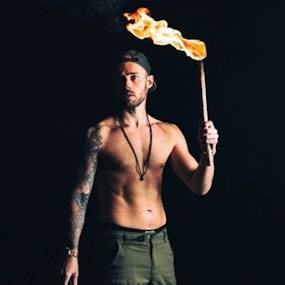
Mike Corey
Host of BBC's The Travel Show
Mike Corey is a marine biology graduate, turned filmmaker, with an intense passion for travel. After receiving his Bachelor of Science in Canada, Mike backpacked the world to volunteer as a research assistant for scientists studying ocean conservation. Bringing a camera along for these trips helped him kick off a career in travel filmmaking, which has now led to a fast-moving career as a travel YouTuber, adventure filmmaker, and TV presenter on BBC Travel.


























